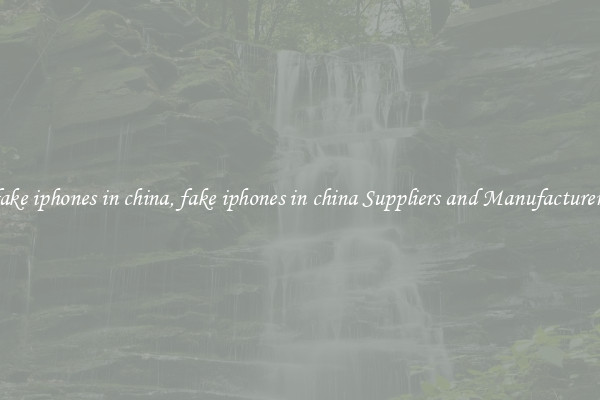fake iphones in china, fake iphones in china Suppliers and Manufacturers
Counterfeit iPhones have become notorious in China, flooding the market with their imitation devices and deceiving consumers. These fake iPhones are prevalent and manufactured by numerous suppliers and manufacturers across the country. With the rise of these counterfeit products, it is crucial to shed light on the issue, its consequences, and the need for strict measures to tackle this growing problem.

The abundance of fake iPhones in China can be attributed to the country's rapid industrialization and the presence of a large manufacturing sector. These counterfeit devices closely resemble their genuine counterparts, with near-perfect replication of the iconic iPhone aesthetics, including the iconic "Apple" logo. To an untrained eye, it is challenging to distinguish between an authentic iPhone and a counterfeit one.
Manufacturers and suppliers of fake iPhones in China take advantage of the demand for Apple products, offering these imitation devices at significantly lower prices. This price discrepancy makes them an attractive option for budget-conscious consumers, unknowingly falling prey to these knockoff versions. These counterfeit iPhones are often sold through unauthorized retailers, online platforms, and even in physical stores.
The consequences of purchasing these counterfeit iPhones extend beyond the monetary aspect. These imitations are generally made with substandard materials and components, resulting in poor quality and unreliable performance. The devices often experience software and hardware malfunctions, leading to an unsatisfactory user experience. In some cases, these fake iPhones even pose potential risks to the user's safety, as they may not undergo the same rigorous testing and safety standards as genuine Apple products.
Authorities in China recognize the seriousness of this issue and have taken measures to combat the production and distribution of fake iPhones. Law enforcement agencies conduct regular raids on illegal manufacturing facilities and unauthorized retailers, confiscating counterfeit devices and imposing fines on offenders. Additionally, Apple has been proactive in working with Chinese authorities to identify and shut down production lines responsible for these counterfeit iPhones.
To protect consumers from falling victim to this scam, it is essential to raise awareness about the signs of a counterfeit iPhone. Potential buyers should be cautious of unusually low prices, poor quality packaging, misspelled words, and the absence of authentication details such as Apple's hologram logo or registration numbers. Purchasing iPhones only from authorized sellers, both online and offline, is the best way to ensure the authenticity of the device and receive proper after-sales support.
In conclusion, the proliferation of counterfeit iPhones in China poses a significant challenge for both consumers and authorities. The issue demands continued vigilance and stricter enforcement to protect consumers and the credibility of genuine Apple products. A collaborative effort between the Chinese government, Apple, and consumers is crucial to combat the production and distribution of these fake devices and maintain a trustworthy marketplace.

View details

View details

View details

View details








